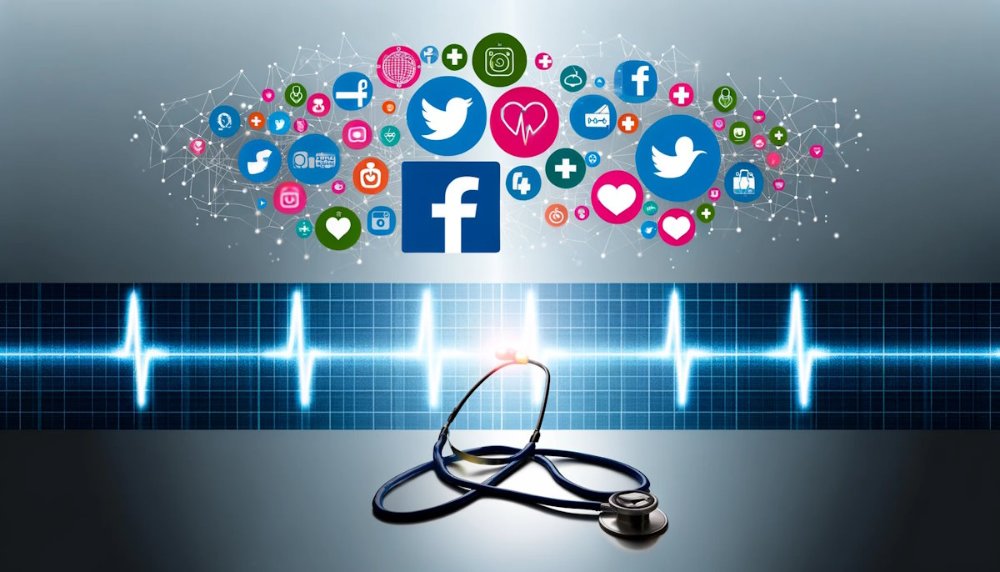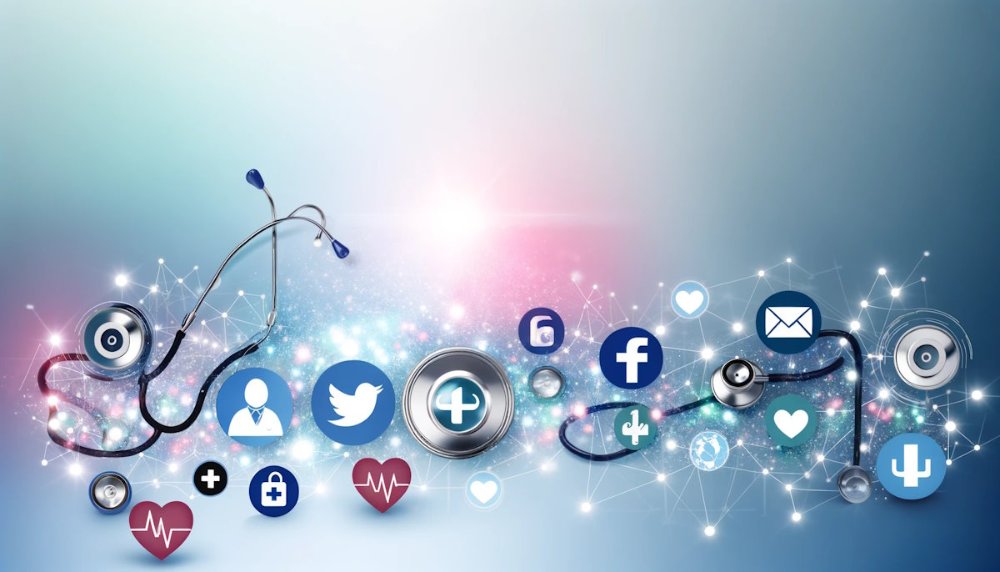- 1. The Rise of Social Media in Healthcare
- 2. Patient Empowerment and Engagement
- 3. Health Awareness and Education Campaigns
- 4. Breaking Down Communication Barriers
- 5. Patient-Provider Interactions in the Digital Age
- 6. Ethical Considerations and Challenges
- 7. Leveraging Influencers and Health Advocates
- 8. Future Trends and Innovations
In the dynamic and ever-evolving realm of healthcare, the amalgamation of the industry with social media has proven to be an influential force, reshaping the landscape of information dissemination, patient engagement, and the promotion of public health initiatives. The pixels that illuminate our screens serve as powerful conduits for healthcare communication, ushering in an era where geographical boundaries and traditional communication channels are transcended. This intersection has unleashed a transformative potential, offering a dynamic platform where medical professionals, organizations, and patients converge in a virtual space.
Through platforms such as Twitter, Facebook, Instagram, and LinkedIn, healthcare stakeholders now navigate a realm of instantaneous and widespread communication. Real-time updates on medical breakthroughs, patient stories, and public health campaigns are shared with unprecedented speed and reach. This virtual connectivity empowers patients by granting them access to an abundance of health-related information, fostering a sense of community that extends far beyond physical limitations. As social media becomes a central hub for health awareness and education campaigns, the pixels on our screens play a pivotal role in disseminating vital information about preventive measures, disease management, and overall well-being.
The transformation is not just limited to patient engagement; it extends to the dynamics between healthcare providers and their patients, as direct communication is facilitated, appointments scheduled, and even virtual consultations conducted. The virtual realm of social media in healthcare is not without its challenges, including the ethical considerations of privacy, misinformation, and responsible content sharing. Nevertheless, as we navigate this digital frontier, the pixels on our screens continue to evolve as powerful agents of change, reshaping the healthcare narrative and fostering a more connected, informed, and engaged global healthcare community.

1. The Rise of Social Media in Healthcare
Social media platforms have seamlessly woven themselves into the fabric of healthcare, emerging as indispensable tools for healthcare organizations, professionals, and patients. The immediacy and widespread accessibility afforded by platforms such as Twitter, Facebook, Instagram, and LinkedIn have ushered in a revolutionary era in the dissemination of healthcare information. In the fast-paced landscape of instant communication, these platforms serve as real-time avenues for sharing crucial updates on medical advancements, public health campaigns, and breaking health news. Healthcare stakeholders now harness the power of these digital forums to swiftly communicate developments, ensuring that information reaches diverse audiences at an unprecedented speed.
Whether it's sharing the latest research findings, promoting health awareness initiatives, or addressing emerging health crises, social media platforms have become central to fostering a dynamic and interconnected healthcare ecosystem. The ripple effect of these virtual channels is felt not only by professionals seeking to stay abreast of industry trends but also by patients who gain timely access to vital health information that can positively impact their well-being.
2. Patient Empowerment and Engagement
The transformative influence of social media on healthcare extends beyond information dissemination to profoundly empower patients and elevate engagement levels. In this digital age, patients wield unprecedented access to a vast reservoir of health information, expert insights, and supportive communities—all conveniently at their fingertips. Online patient forums and groups, thriving on platforms like Facebook and Reddit, provide individuals with a virtual space to candidly share personal health experiences, seek advice, and forge connections with others undergoing similar journeys.
This dynamic interaction transcends geographical limitations, creating a global network where patients can draw strength from collective wisdom and shared narratives. The sense of community fostered through these virtual forums not only offers emotional support but also empowers individuals to take a more active role in managing their health. This democratization of information and support signifies a paradigm shift in patient-provider dynamics, as individuals become more informed, engaged, and connected participants in their healthcare journeys.
3. Health Awareness and Education Campaigns
Social media has evolved into a potent catalyst for driving health awareness and education campaigns, becoming a dynamic arena where organizations leverage the expansive reach of platforms to disseminate crucial information. In the digital realm, social media serves as an influential tool for educating the public on preventive measures, effective disease management strategies, and fostering healthier lifestyle choices.
Health-related campaigns, spanning topics such as vaccination awareness, mental health advocacy, and chronic disease management, gain momentum through the viral nature of social media, transcending geographical and demographic boundaries. The ability to share content rapidly and engage diverse audiences globally enables these campaigns to make a profound impact on public health discourse. This democratization of health information not only educates the masses but also empowers individuals to make informed decisions about their well-being, marking a paradigm shift where social media becomes a driving force in promoting a culture of proactive health consciousness.
4. Breaking Down Communication Barriers
In the intricate landscape of healthcare, effective communication is frequently impeded by the prevalence of complex medical jargon and technical terminology. Social media emerges as a vital bridge, adept at dismantling these barriers by translating intricate medical information into easily digestible content. Platforms like Twitter, Instagram, and YouTube serve as conduits for healthcare professionals and organizations to disseminate information through visually engaging formats such as infographics, videos, and interactive content. This not only captures the attention of a diverse audience but also simplifies healthcare information, making it more accessible and understandable to individuals from various backgrounds.
The integration of multimedia elements, coupled with the utilization of Electronic Health Record (EHR) software, in healthcare communication on social media becomes a potent tool for promoting health literacy. This approach ensures that a broader spectrum of the population can comprehend and engage with critical health information. By leveraging multimedia formats, such as videos, infographics, and interactive content, alongside EHR software, the traditionally complex discourse surrounding healthcare is transformed into a more approachable and interactive format. Social media, thus, becomes a dynamic platform that cultivates a population better equipped to navigate healthcare insights and make informed decisions about their well-being. The synergy between multimedia elements and EHR software not only enhances the accessibility of health information but also contributes to a more comprehensive and user-friendly healthcare communication landscape, fostering a populace empowered to actively participate in their health journey.

5. Patient-Provider Interactions in the Digital Age
In the contemporary healthcare landscape, social media has revolutionized the dynamics of patient-provider interactions. Healthcare professionals now leverage platforms such as Twitter and LinkedIn as powerful tools to disseminate valuable insights, actively engage in medical discussions, and connect with a broader audience. This shift in communication allows for direct and immediate interaction between patients and healthcare providers, facilitating seamless exchanges such as quick queries, appointment scheduling, and even virtual consultations. The utilization of social media in healthcare not only enhances the accessibility of medical professionals but also transforms the patient experience by fostering a more collaborative and responsive healthcare environment. This digital evolution underscores the importance of leveraging technology to create a patient-centric approach, where information is shared transparently, and communication becomes a dynamic and integral part of the healthcare journey.
6. Ethical Considerations and Challenges
Although the influence of social media on healthcare communication is predominantly positive, ethical considerations and challenges necessitate acknowledgment. The paramount concern revolves around privacy issues, as the ease of communication on platforms like Twitter and LinkedIn raises questions about the confidentiality of patient information. Additionally, the pervasive presence of misinformation on social media underscores the need for stringent guidelines and responsible use within the healthcare community. The potential for the rapid spread of unverified medical advice poses a significant challenge, necessitating healthcare professionals to exercise caution in their online interactions.
Striking a delicate balance between promoting accurate health information and mitigating the dissemination of false or misleading content is crucial for maintaining the integrity of healthcare communication on social media. Adhering to ethical standards and embracing responsible practices in the digital realm is imperative to ensure that the benefits of social media in healthcare outweigh its potential pitfalls.
7. Leveraging Influencers and Health Advocates
The emergence of health influencers on platforms such as Instagram and YouTube has introduced a distinctive dimension to healthcare communication. Influencers and health advocates utilize their platforms to share personal health journeys, impart wellness tips, and endorse various health products. This approach adds a relatable and personal touch to health-related discussions, resonating with audiences on a more human level. Collaborations between healthcare organizations and influencers further amplify the reach of health campaigns, creating an effective bridge to engage audiences that might be challenging to reach through traditional means. The partnership between influencers and healthcare entities leverages the influencers' established rapport with their followers to promote health awareness, encourage positive lifestyle changes, and foster a sense of community around shared health experiences. However, it is crucial to navigate these collaborations with transparency and ethical considerations to ensure the authenticity and credibility of health information shared through influencer channels.
8. Future Trends and Innovations
Anticipating the future, the convergence of artificial intelligence (AI), virtual reality (VR), and augmented reality (AR) within social media platforms is poised to propel a transformative shift in healthcare communication. The integration of AI-driven health chatbots and virtual support groups could offer individuals unprecedented access to real-time health information, personalized assistance, and emotional support.
Virtual reality has the potential to immerse users in lifelike healthcare experiences, facilitating enhanced understanding and empathy. Augmented reality in healthcare is revolutionizing diagnostics, surgical planning, and patient education by providing real-time, interactive visualizations. Augmented reality, on the other hand, could overlay valuable medical information onto the physical world, aiding in health education.
This technological integration not only revolutionizes how individuals access information but also reshapes the dynamics of patient engagement and empowerment. By providing immersive and interactive healthcare experiences, the fusion of AI, VR, and AR in social media platforms is poised to usher in a new era of healthcare communication, fostering greater connectivity, understanding, and empowerment within the healthcare journey.
In conclusion, the power of pixels on our screens has transformed healthcare communication, offering unprecedented opportunities for information dissemination, patient engagement, and public health advocacy. Social media has become an indispensable tool for healthcare professionals, organizations, and patients, fostering a dynamic ecosystem that transcends geographical boundaries. As we navigate the ever-evolving digital landscape, the responsible and strategic use of social media in healthcare communication will continue to shape the future of the industry, ensuring that pixels empower, educate, and connect us for better health outcomes.